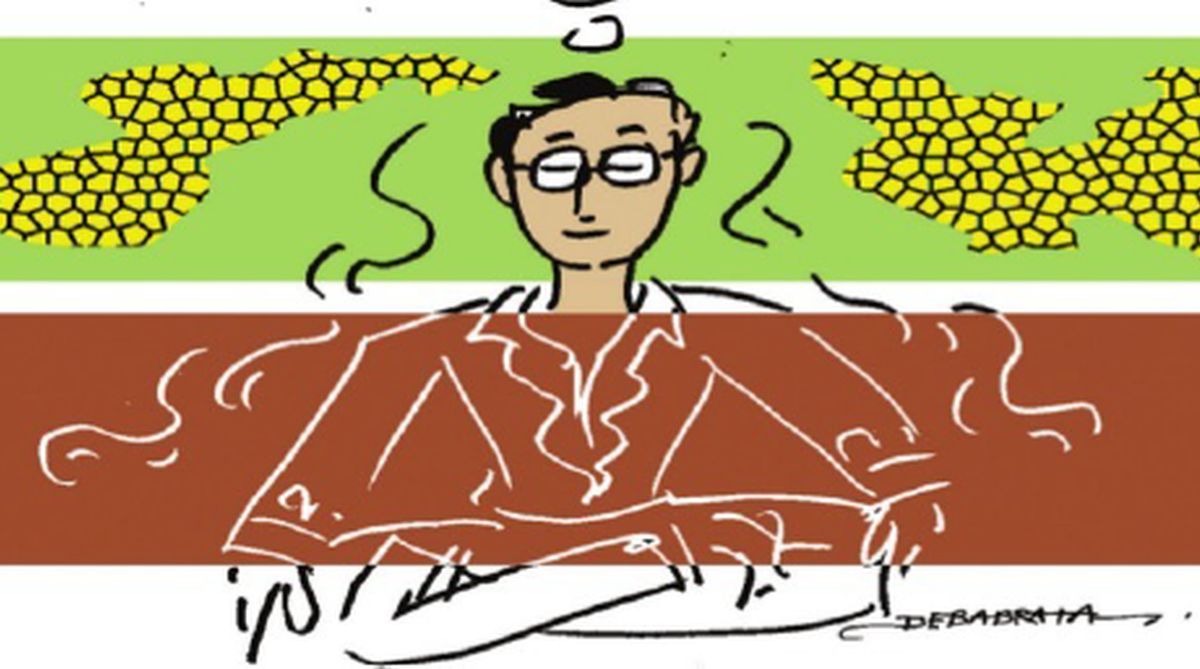Why your brain loves it when you meditate: Study answers
In today’s high-tech world, researchers are using brain imaging tools like fMRI to try to visualize what it means to still the mind.

(Illustration: Debabrata Chakraborti)
I had lost a friend some time back, but I am glad that I have got the relationship back. I know this sounds strange, but I am talking about meditation. Many seem to associate meditation with religion.
There are the statues of Buddha in deep meditation; the strange lotus posture of practitioners, often in a room reeking of incense; and the reference to words like Vajrayana and Vipassana.
Advertisement
Meditation for me is neither exotic nor mysterious. It is a down-to-earth activity that has been a part of practically every ancient tradition of developing yourself. It is a practice that brings peace and calm, helps overcome tension and lets you focus on whatever means the most to you.
Advertisement
I started exploring when I was in Nepal. Whether it was the ever-present beauty of the snow-capped mountains or the simple, sturdy belief of the hill people in ‘going inside,’ I was intrigued enough to give it a try.
I visited the Swayambhunath and Bouddhanath temples, as all tourists do, and I loved the elegance of the Lumbini monastery and the peace and quiet of the Kopan monastery. But it was the modest Seto Gumpa that had my steadfast loyalty.
Rimpoche Chokyi Nima is a pleasant middle-aged person. He has a strong build and a soft voice. For a spiritual person he has a singularly earthy style and speaks on the most esoteric themes in the most pragmatic way.
He will readily show you around the monastery and explain its procedures, but he seems most at home answering your questions at length. No question is too basic or too silly for him. He answers you simply, clearly and with utmost humility.
He helped me realize how much my past training restricts my view of myself. If I break my leg or develop high fever, I go to the doctor and take medicine. Short of that, I rarely notice what is happening in my own body.
I eat at certain hours, but I seldom notice a twinge of hunger. I work during the day, as I am supposed to do, but scarcely observe any special pleasure or discomfort while doing it. My body may be telling me of a certain unease, but I would usually ignore it until it became onerous.
Take another example. If my colleague was rude or my client insulted me, I would nurse my pain in silence, because that is the ‘manly’ thing to do. At best, if I shared it with a friend, he would probably curse the perpetrator and urge me to ignore it. But the pain would persist and would fade only with time.
Yet there is a better answer. All pain, like all joy, comes through the mind, and our mind is usually like an untrained horse, running unruly in different directions. There is a simple way to discipline that horse and exercise control over what we allow to upset or exhilarate us. Meditation, the simple act of sitting quietly and focusing, mindfully and for a short period, allows me to start reining my wayward mind.
It is amazing that, though we flatter ourselves as reasonably disciplined people, we find it infernally hard to keep our mind on a single theme, like our breathing, for a few seconds.
I live in a beautiful area with charming trails, and, when I walk, I have noticed that I have often, over a twenty-minute stroll, noticed nothing. Nothing at all. I am blinded by my thoughts, imprisoned in a small cell of trivial concerns and petty regrets.
Let alone the majestic green trees in my suburb or the shiny gray clouds of the season, I go through my day, like most of my neighbours I guess, observing little, feeling nothing, caged in a daily routine of insignificance. The little attention I pay to my own body, shaving or showering, lets me detect a scratch or cut after days, and a change of feeling or sensation possibly after weeks.
The most wonderful thing about those twenty or thirty minutes of meditation is that, cutting out a specific time out of the hurly-burly of life, I am deliberately taking care of myself – and thus taking care of everything else. It feels like a reassuring companionship. I have a good friend back.
The writer is a Washington-based international development advisor and had worked with the World Bank. He can be reached at mnandy@gmail.com
Advertisement
In today’s high-tech world, researchers are using brain imaging tools like fMRI to try to visualize what it means to still the mind.
Buddha's principle of the middle path is relevant in today's time of global uncertainty, India's Permanent Representative to the United Nations, P. Harish, said here at the commemoration of Vesak.
The holy Buddha relic exposition witnessed a sea of devotees on Saturday, with lakhs of devotees lining up since early morning to pay homage to Lord Buddha.
Advertisement
